Ayurveda provides extensive guidelines on natural remedies for menopause symptoms. It is a holistic system of medicine that widely recognizes, how difficult can an unbalanced menopause be!
According to Ayurveda, Menopause marks the beginning of the Vata stage of life. It is a period of transition, in which a woman is prone to health imbalances and extreme emotional distress.
So, she needs to carefully manage her health with right nutrition, proper rest and balancing lifestyle.
That’s why, it is so important to adopt natural remedies for menopause rather than abusing your fragile body with artificial hormones and strong medications. And in this post, you will get the much needed information on all of this.
Firstly, you will learn to identify the root cause or health imbalances of your specific Menopause symptoms per Ayurvedic principles.
Secondly, we will take you through the right foods, lifestyle and natural remedies for Menopause according to your own imbalances.
And finally, you will find all natural health tips to prevent Menopause health risks and for health in the long term.
Let’s get started!
What is Menopause?
Menopause means “pause” or permanent stop on menstruation. It is a natural biological stage in the life of a woman.
Onset of menopause brings changes in multiple hormones that help this process to take place. As a number of hormones are disturbed, it often causes multiple health issues for a woman.
Menopause is clinically declared when a female has not had menses for 12 consecutive months.
Menopause Age
The average age of Menopause is described to be 51 years in modern scientific texts and in the Ayurvedic texts. However, the actual age of Menopause varies in the range of 45 years to 55 years.
Menopause can be natural or induced due to certain medical conditions. Some women may also experience early menopause, which could be in late 30s or early 40s.
Natural Menopause
Some of the factors that guide Natural Menopause are:
- Hereditary — Age of your mother or sisters at Menopause
- Diet and Lifestyle — A stressful lifestyle, smoking, and poor nutrition may lead to early menopause
Studies have indicated that Early Menopause poses health risks involving Heart Health and Poor Bone Density. On the other hand, late Menopause is associated with the risk of Breast Cancer.
Surgical or Induced Menopause
Surgical removal of the ovaries can result in artificial or Induced menopause at any age. Hysterectomy is surgical removal of the uterus. If the ovaries are also removed during a hysterectomy then it leads to induced menopause.
Menopause through external intervention is sudden and a woman’s body is not yet ready to handle the hormonal changes that result from a hysterectomy.
One may suffer from serious health complication related to heart and bone function if they do not adopt a suitable diet and lifestyle after a hysterectomy.
4 Stages of Menopause
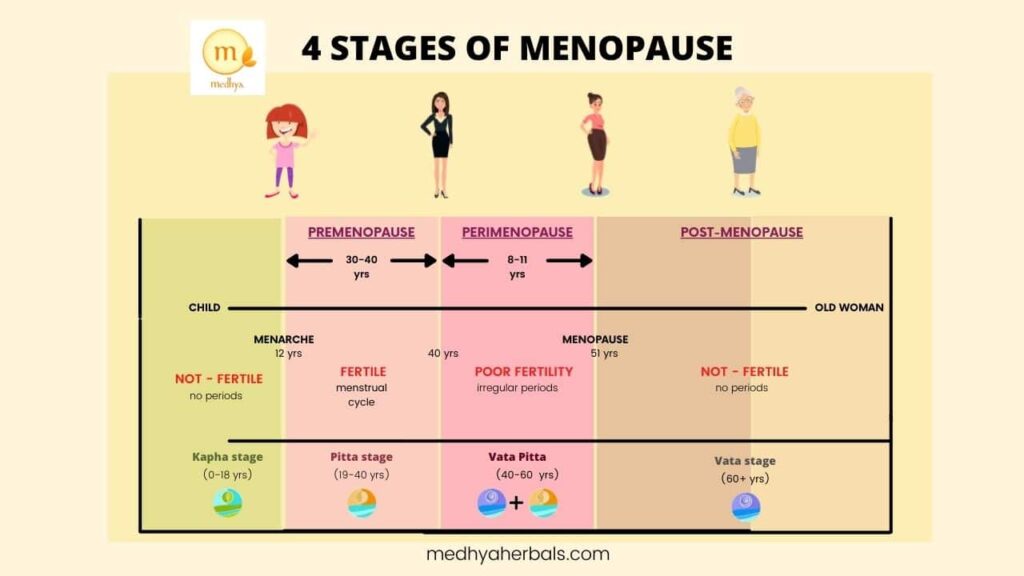
1. Pre menopause
The fertile phase. It is the period of active menstruation and stretches between the first and last menstrual periods. It runs for about 30-40 years.
2. Perimenopause
Perimenopause is a hybrid word involving peri, Greek for “around” or “near” and menopause. It is a transition period or a road to the final stop of Menopause.
Perimenopause begins when you hit 40 or around that, and lasts for 4-11 years. It is marked by fluctuating estrogen levels and declining levels of progesterone.
A woman slowly undergoes physical, hormonal and psychological changes during perimenopause.
3. Menopause
Menopause is defined as the final stop of monthly menstrual cycle. It is a one-time event, which is marked by the last menstrual period.
Clinically menopause is declared when a woman hasn’t had any periods for 12 months in a row. It can reach up to 60 years for some.
4. Post menopause
After these 12 months are over, then the woman has really entered into post menopause. The term is used interchangeably with menopause, however.
Menopause Symptoms
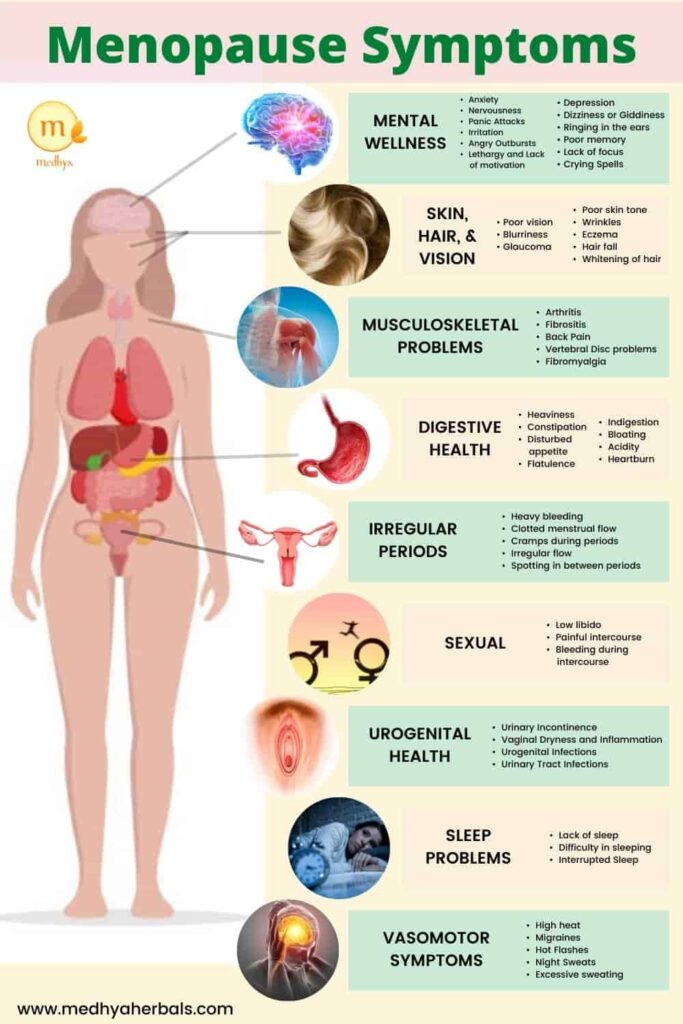
There is wide variation in the functional symptoms observed during menopause. Different women experience different menopause symptoms depending on their specific health status.
Some of the changes that health discomforts and health issues experienced during menopause are listed below:
- Digestive health issues such as Indigestion, Bloating, Acidity, Heartburn, Heaviness, Constipation, Disturbed appetite, Flatulence
- Vasomotor Symptoms involving High heat, Migraines, Hot Flashes, Night Sweats, Excessive sweating
- Slow Metabolism leading to weight gain. Hence, one needs to be watchful of their food intake and physical movement.
- Inadequate assimilation of nutrients and Nutritional Deficiencies resulting in poor quality tissues such as skin, hair, bones, and muscles.
- Sexual health issues involving Low libido, Painful intercourse, Bleeding during intercourse
- Poor urogenital health, resulting in vaginitis and urinary tract infections.
- Lack of sleep and difficulty in sleeping
- Poor bone health resulting in joint stiffness and pain
- Low muscular mass resulting in flabbiness and fatigue
- Psychological issues such as Anxiety, Nervousness, Panic Attacks, Angry Outbursts, Lethargy and Crying Spells
- Lack of focus and poor memory
Health Risks of Untreated Menopause Symptoms
Menopause symptoms that arise due to health imbalances in the body need to addressed in time. If not, these imbalances keep piling up.
They can eventually trigger chronic health conditions such as Obesity, Diabetes, Heart Disease and Osteoporosis. Your health risks increase with the severity of menopause symptoms.
That is, if you are experiencing symptoms as severe hot flashes, or heavy bleeding, or extreme fatigue; you need to take immediate action and consult your doctor for proper treatment.
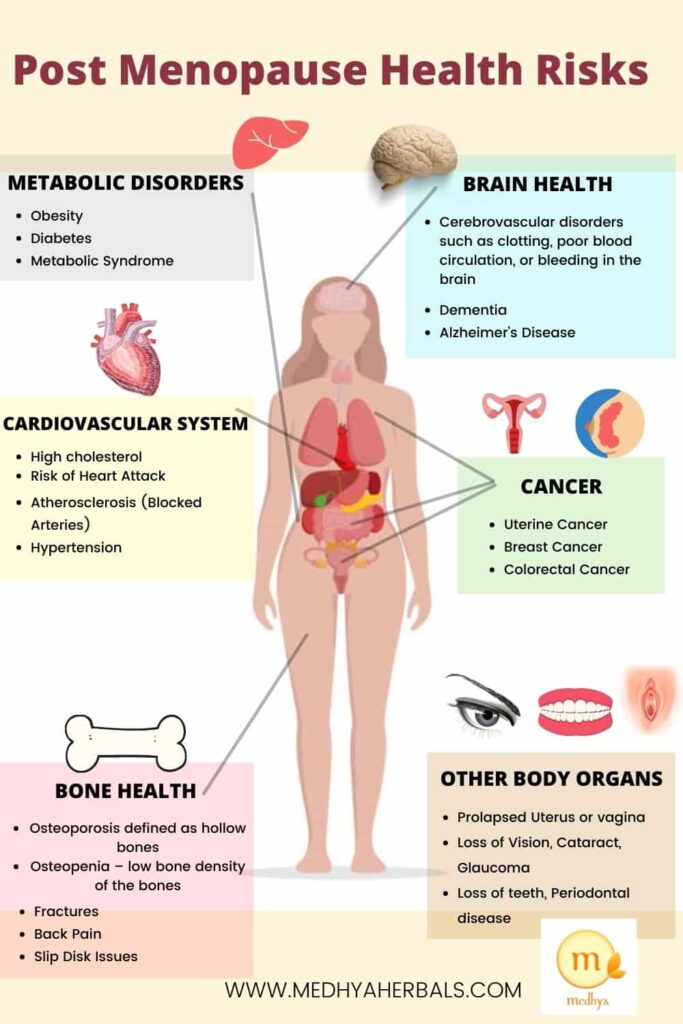
- Cancer
- Fractures
- Osteoporosis or porous bones
- Severe backache and slip disk
- Loss of teeth
- Loss of vision, cataract
- Diabetes
- Obesity
- Dementia
- Alzheimer’s Disease
- Bleeding in brain
- Atheroscelorosis or narrowing of arteries
- Hypertension
Menopause in Ayurveda
Menopause is termed as “Rajonivritti” or absence of bleeding in Ayurveda. It is considered to be a transitionary phase, where a woman moves from Pitta dosha to Vata dosha dominated stage of life.
This transition makes both Vata and Pitta dosha unbalanced. This leads to menopause symptoms of dryness, fatigue, hot flashes and hormone imbalances to name a few.
In addition, if a menopausal woman had Kapha imbalance, it leads to health symptoms as menopausal weight gain and high cholesterol.
According to Ayurvedic principles, a woman needs to adapt with complementary changes in her lifestyle and diet. This will help her fare through the menopausal transition without any health issues.
However, her health symptoms become worse due to excess stress, environmental chemicals, lack of routine, faulty diet and sedentary lifestyle.
Now, let’s look into specific health symptoms of Menopause per dosha imbalance
Vata Imbalance Menopause Symptoms
A woman usually enters Menopause at the median age of 50 years. In Ayurveda, this phase of life is dominated by Vata Dosha.
Vata is the energy of catabolism, hence many degenerative changes take place during this phase of life.
- Vaginal Dryness
- Extremities get cold
- Insomnia and sleep disorders
- Mild to variable hot flashes (Invariable)
- Anxiety
- Panic
- Nervousness
- Mood swings
- Dry and wrinkled skin
- Palpitations
- Bloating
- Constipation
Pitta Imbalance Menopause Symptoms
During the old age, our Pitta Dosha levels start to wind down, hence our metabolism is effected. Pitta Dosha changes also bring changes in hormones and in the reproductive system.
- Anger
- Irritability
- Excessive hot flashes
- Night sweats
- Extremely heavy periods with a burning sensation
- Skin rashes
- Associated complaints such as UTI (urinary tract infection)
- Acidity, Heartburn
- Ulcerative Colitis
- Low Iron levels or Anemia
- Inflammation in vagina
- Estrogen Dominance
- Hypoglycemia
- Food cravings for cold and sweet foods
Kapha Imbalance Menopause Symptoms
Ideally, Kapha Dosha should be the least affected during Menopause. However, modern lifestyle has its own perils with sedentary lifestyles and calorie rich diets.
This is just enough to push Kapha out of balance and lead to related symptoms.
- Menopausal Weight gain
- Feeling of heaviness
- Lethargy
- Depression
- Lack of motivation
- Low thyroid and Hypothyroidism
- Fibrocystic changes in the uterus or in the breast
- Excessive fluid retention
- Sentimental and Highly emotional
- Lack of Interest
Having understood all of these, we can now talk about the natural remedies for Menopause with Ayurveda.
Natural Remedies for Menopause Symptoms
Ayurveda can help to prevent the health risks and find relief from menopause symptoms. Ayurvedic treatment and natural remedies for Menopause focus on health and vitality with:
- Aahara (Food)
- Vihara (Lifestyle)
- Aushadhi (Medicines and Herbal formulations)
- Karma (Treatment)
Let’s discuss these through and understand how Ayurvedic treatment and remedies can help with Early Menopause.
Menopause Diet, Foods and Nutrients
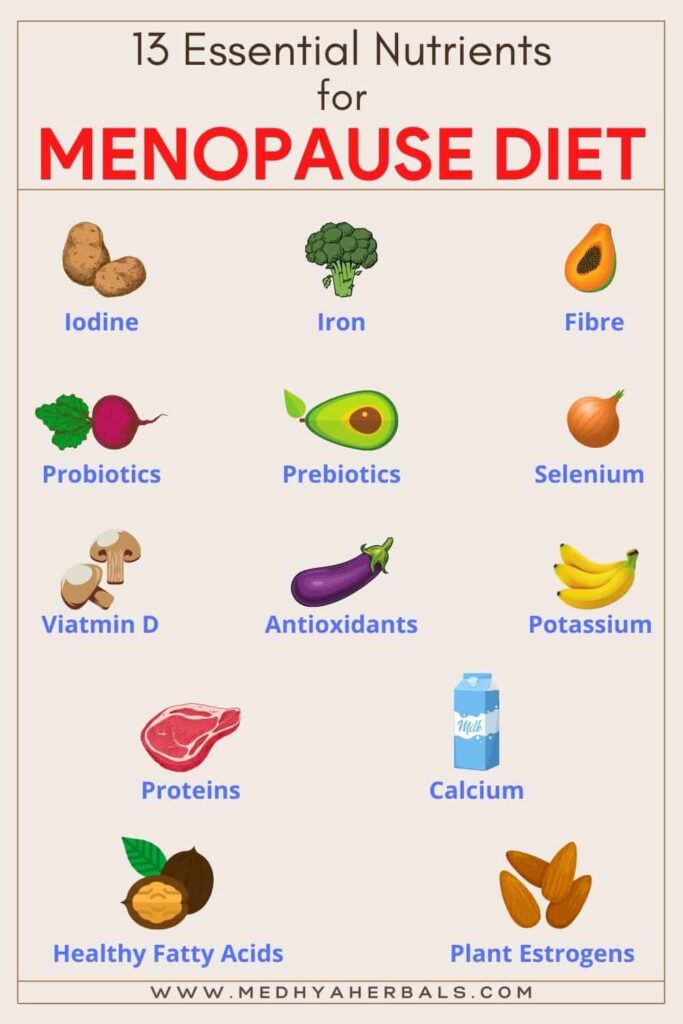
1. Best Foods and Menopause Diet
- Whole foods such as grains, fruits, and vegetables
- Vitamin E – nuts, eggs, olive oil
- Vitamin D – sunlight, mushrooms, egg yolk, fish liver oils
- Calcium Foods – milk and milk products, green leafy vegetables, cereals, fruits like custard apple and dates
- Phosphorus – milk, dry fruits, guava to maintain healthy bones
- Sweet juicy fruits like grapes, pears, plums, mango, melons, and apples also serve the purpose to alleviate hot flashes.
- Summer vegetables like yellow squash and cucumber are also advised as good options, specifically for hot flashes.
- Stay hydrated with warm water and herbal teas.
- Phytoestrogens to naturally balance the declining levels of Estrogen.
- Herbal teas made from lemongrass, fennel, cumin, carom seeds, and fenugreek to balance the hormones and also for micro nutrients.
2. Worst Foods for Menopause
- Spicy food, extremely hot, and fried foods
- White flour-based products
- Refined and processed foods
- Chocolate, Coffee, and Black Tea
- Unhealthy and burnt fats like vanaspati and refined vegetable oil
- Sugary foods
- Excessive salt. Avoid table salt and replace with little amounts of rock salt
- Alcohol should not be taken as it aggravates Vata Dosha, promotes constipation, and leads to dryness of the body
3. Ayurvedic Lifestyle for a Healthy Menopause
- Eat regular meals at about the same time of day
- Get enough sleep of at least 6-8 hours. Go to bed early and rise with the Sun.
- One should not eat during nervousness and worries.
- Avoid staying up late at night.
- Do not eat till late in the night.
- Quit or avoid smoking specifically if you are suffering from hot flashes.
- Women should avoid the suppression of natural urges and excessive physical activity.
4. Exercise and Physical Activity
Regular exercise during Menopause is really important to prevent muscle loss, maintain strength, lose weight and protect your bones.
The benefits of physical activity at Menopause go beyond the visible signs. Exercise is also one of the most important tools to keep your stress levels low, improve brain function and have better control on your emotions.
Make sure you exercise for at least 30 minutes a day. Avoid extreme physical activity and very strenuous exercises though. This is specifically true if you are struggling with hot flashes, anxiety and fatigue.
Do note that you should not carry out excessive or strenuous exercise during menopause. Excessive exercise can create further imbalances in Vata and Pitta dosha.
That’s why gentle and balancing exercises are the best way to maintain health during menopause.
Regular exercise improves symptoms like bloating, anxiety, sleep problems and mood swings etc. You will notice an increase in your appetite too. Here are some exercises that you should engage on daily basis:
- Walking
- Strength building and weight bearing activities
- Tai-chi
- Yoga asanas
- Pranayama (breathing exercises)
7 Days Exercise Plan for Menopause
Here’s 1 week exercise plan for you to begin with:
| Day | Activity |
| 1 | Brisk Walk for 30 mins. Keep breathing deeply through your nose. Avoid breathing through mouth at all points. |
| 2 | 10-20 cycles of squats 5-10 mins of jumping jacks or skipping the rope 20 cycles of lunges |
| 3 | Brisk Walk for 30 mins. Keep breathing deeply through your nose. Avoid breathing through mouth at all points. |
| 4 | 30-40 mins of bicycling, swimming, or brisk walking. Alternatively, you can do cycling motion (10-15 mins) in the bed while keeping your legs raised and 10 mins of breathing exercises. |
| 5 | Yoga for 15 mins – Include different yoga poses such as Bridge pose, Churning the mill pose, Cobra pose 4-5 Cycles of Sun Salutation 10 mins of Deep Breathing exercises |
| 6 | Brisk Walk for 30 mins. Keep breathing deeply through your nose. Avoid breathing through mouth at all points. |
| 7 | 10 cycles of Sun Salutation 10-20 cycles of squats 10 mins of Deep Breathing exercises |
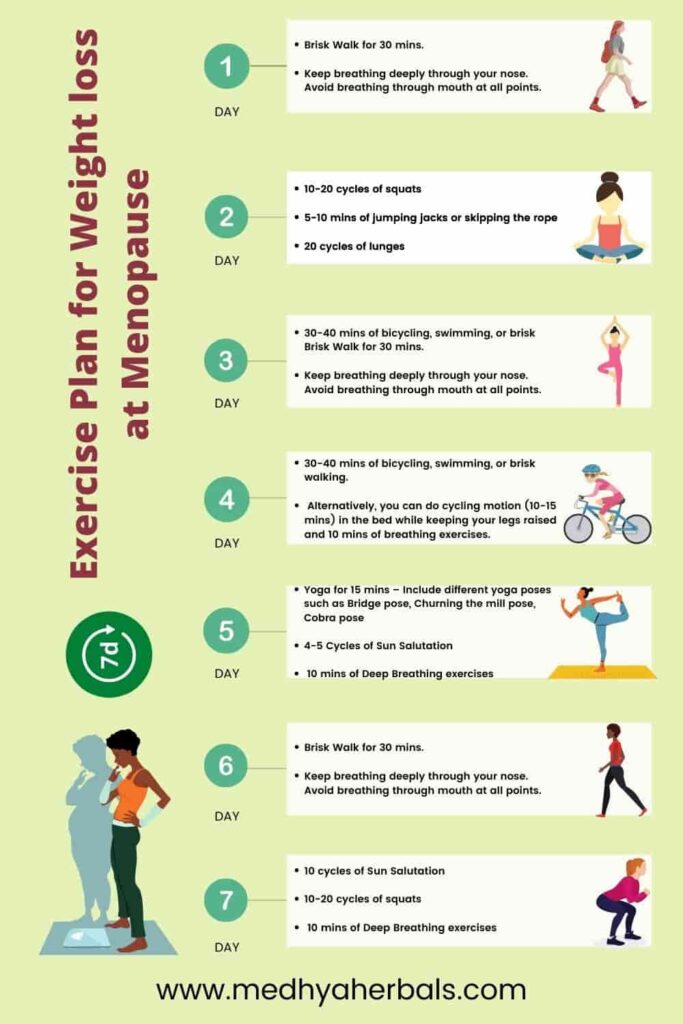
5. Yoga and Pranayama
Yoga plays an important role in relief from menopausal symptoms. Regular practice of yoga helps to make the body more flexible, improve posture, and ease many menopausal problems.
Pranayama and breathing exercises have positive benefits for both the physical and mental health of menopausal women. Some yoga asana that you should practice are:
- Anuloma Viloma Pranayama
- Kapalbhati Pranayama
- Trikonasana
- Tadasana
- Padmasana
- Matsyasana
- Shalabhasana
6. Panchakarma – Ayurvedic Treatment for Menopause Symptoms
Panchkarma chikitsha or therapy involves physical therapies that thoroughly cleanse the body and help establish dosha balance.
- Snehan, Swedana is very beneficial in curing various ailments of Menopause.
- Abhyanga followed by light Swedana helps to pacify Vata and improves circulation.
- Shirodhara is very effective in hot flashes. Also, it helps to improve mental wellness and menopause symptoms like mood swings, anxiety, and depression, etc.
- Hrid Basti and Dhara also helps to alleviate these symptoms.
Ayurvedic Herbs for Menopause Symptoms
Here is a list of Ayurvedic herbs that can help you to balance hormones, prevent and reduce the intensity of menopause symptoms.
These herbs are not concentrated form of supplements, which often aggravate menopause symptoms.
Also, Ayurvedic plant based remedies remove the imbalances by acting on specific body tissues. Thus, you also avoid the side effects that often come with generic medications.
However, these herbs are potent in nature. They can have deep effect on your body and mind. Hence, they should always be consumed under a trained Ayurvedic Physician. Please do not do self treatment with herbs.
7. Ayurvedic Herbs for Dryness and Hormone Balance
- Aloe vera gel – Reduces Heat, Detoxifies, Improves circulation, stimulates uterus and thyroid
- Kapikacchu – Hormone Balance, Antioxidants, uterine tonic, improves mood
- Fennel – Supports Estrogen balance, Reduces Heat and Improves Circulation
- Yashtimadhu (Licorice) – Promotes hormone balance, gut health and improves brain function
- Dashamula – Hormone balance thyroid and progesterone, improves circulation, detoxifies
- Saffron – Hormone Balance and Progesterone, Detoxifies
- Marshmallow Root – Improves circulation, reduces dryness in reproductive organs, detoxifies
8. Ayurvedic Herbs for Heavy Bleeding and Hot Flashes
- Aloe vera gel – Reduces Heat, Detoxifies, Improves circulation, stimulates uterus and thyroid
- Amla – Detoxifies, Boosts Metabolism, Reduces Heat and Inflammation
- Triphala – Detoxifies, Supports digestion, reduces heat and inflammation
- Vidari – Hormone Balance, Estrogen and Progesterone, Reduces Heat
- Arjuna Bark – Reduces heat and balances Pitta, promotes hormone balance, uterine tonic
- Motherwort – Balances Pitta, reduces heat, prevents hot flashes, heavy bleeding and fibroids
- Lady’s Mantle – Balances hormones, prevent heavy periods and reduces pain during perimenopause
9. Ayurvedic Herbs for Sleep and Mental Wellness
- Shatavari – Uterine tonic, reduces heat, Hormone Balance, Improves Mood, Detoxifies
- Ashwagandha – Brain health, Strength, Improves Mood, Circulation and Hormone Balance
- Shankhpushpi – Improves brain function, memory, and stress response, reduces anxiety
- Gotu kola – Improves circulation, detoxifies, improves mood and concentration
- Brahmi – Improves circulation, mood and brain function, detoxifies
- Jatamansi – Improves sleep, mood and brain function, reduces anxiety
- Valerian Root – Reduces Anxiety, calms the mind, improves sleep
10. Natural Remedies for Menopause Symptoms of Vata Imbalance
- Eat warm, well-cooked meals, e.g. soup,. Ensure you eat at regular times.
- Use spices generously. Some excellent choices of spices include cinnamon, fennel, ginger, cardamom, turmeric, basil.
- Stay away from cold and raw foods, salads, excessive salt.
- Include healthy oils in your diet, and massage yourself daily with oil.
- Practice yoga, tai chi, and meditation. This encourages internal calmness.
11. Ayurvedic Remedies for Menopause Symptoms of Pitta Imbalance
- Eat fresh, cool, and soothing foods. For example, cucumber, coconut, and melons make for good choices.
- Use bitter, sweet, and calming herbs. These include fennel, coriander, mint, dill, skullcap, etc.
- Avoid hot, oily, and spicy foods and pungent foods, e.g. a green chili hamburger.
- Reduce stimulants (like coffee), cool your mind, and encourage relaxation.
12. Natural Remedies for Menopause Symptoms of Kapha Imbalance
- Focus on warm, stimulating, light, and nourishing foods
- Use spices in everything- food and beverages. Black pepper, cloves, cardamom, ginger are some spices to try.
- Avoid dairy products. You can take goat cheeses and soft cheeses moderately, however.
- Practice stimulating exercise, eat less, and regulate your sleep.
Now we want to hear from you. Do write to us for any queries and feedback. If you have tried any of the above Ayurvedic remedies, then do share your experience with us. We will get back to you the soonest.
Wishing you vibrant health!
References


Too many people don’t know that shampoos that grow your hair faster and longer (obviously with no sulfates, no parabens, no DEA) exist. Individuals can now experience longer hair and have more options. For sure worth exploring.
Whether you’re exploring hair loss, hair damage, avoiding scalp disorders, hair growth, hair health more often than not, the same principles actualize.
As a general rule, you have to stay away from hair treatments and products that use chemicals such as parabens, DEA or sulfates.
What’s beneficial for your hair is healthy for your skin as well.
It goes without saying the content here is so accurate for many reasons. It avoids the common mistakes and mistakes so many fall into: using defective alternatives. Thank you so much!
Ayurvedic medicine for menopause balances hormones naturally with herbal remedies, diet, and lifestyle changes